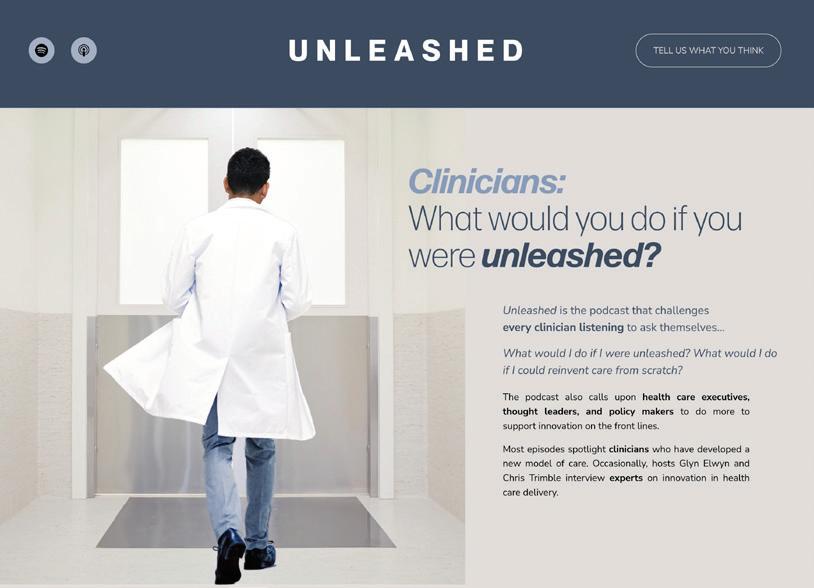
4 minute read
A Culture of Innovation
Levy Incubator projects are transforming care
Improving health and healthcare for people living in northern New England through innovative models of care delivery—that’s the goal of the Susan and Richard Levy Health Care Delivery Incubator, a joint venture between The Dartmouth Institute for Health Policy & Clinical Practice at Geisel and the Department of Community and Family Medicine at Dartmouth Health. A recent $3 million gift to the Incubator by Richard Levy will expand the boundaries of its work by supporting a three-year initiative aimed at transforming primary care.
“A key feature of all models will be the expectation that social services be integrated into clinical care delivery,” says Amanda Perry, program manager for The Dartmouth Institute for Health Policy & Clinical Practice. “We know that community-based social services can effectively address the social drivers of health, including housing, nutrition, education and employment. By encouraging collaborative innovation between primary care and social services, we hope that we can improve the health of the communities we serve.”
The Incubator’s initiatives are part of the innovation arm of Dartmouth’s recently launched Northern New England System Transformation for Primary Care (NNESTPC). In addition to innovation, NNEST-PC supports primary care research, education and policy development to implement the recommendations of the National Academies' “Implementing High Quality Primary Care” report in our region. These efforts seek to address a shortage of primary care providers, unequal access to services and inadequately designed payment models.
According to Community and Family Medicine department chair Elisabeth Wilson, MD, MS-HPEd, MPH, “Those issues all
contribute to growing health disparities. Recent policy efforts focus on expanding access through telemedicine, increasing funding for community health centers, promoting models that prioritize outcomes over volume and mandating a fraction of an insurer’s total spend on primary care services.” Enhanced reimbursement rates, loan forgiveness programs and investments in workforce development are also being explored.
Since its creation five years ago, the Levy Incubator has funded and supported 17 teams that have made impressive progress in enhancing the quality of care for patients, improving the patient and provider experience, reducing costs and decreasing unnecessary, ineffective or unwanted clinical interventions.
Over the years, the Levy Incubator has fostered a culture of innovation. “We unleash providers from existing constraints in order to transform the way they provide services, immediately and locally,” says Amber Barnato, MD, MPH, MS, department chair and director of The Dartmouth Institute for Health Policy and Clinical Practice. “During their 12 to 18 months in the Incubator, teams design and implement significant changes that some clinical departments may take years to do. And that energy is infectious—providers talk to their peers about their experiences in the Incubator.”
Many of the projects focused on vulnerable populations across a wide spectrum of need. Innovations included the establishment of perioperative cognitive and frailty screening in older adults, and operationalizing a home-based telehealth step-down unit for pre-term infants with remote monitoring. Other examples include the development of an in-unit treatment
program for youth waiting in the hospital for an inpatient psychiatry bed, and the creation of a coordinated transition program for individuals released from prison with healthcare needs, including rapid access to primary care. Critically, almost all of these innovations have been sustained locally after the project funding ends, which is relatively uncommon in traditional models of research. “This is because we have been able to demonstrate real return on investment, build sound business plans and ensure broad buyin,” Perry says. In an effort to scale these ideas, the Incubator shares these successes in their podcast “Unleashed.”
In addition to health system goals, the Incubator has academic goals: to publish, build partnerships with other centers to test implementation at other sites and leverage Dartmouth Health networks. They anticipate further academic successes in the next three years.
Perry says, “The word has spread; we received 19 inquiries for applications to our next cohort even before we publicly shared the new RFA (Request for Applications).”








